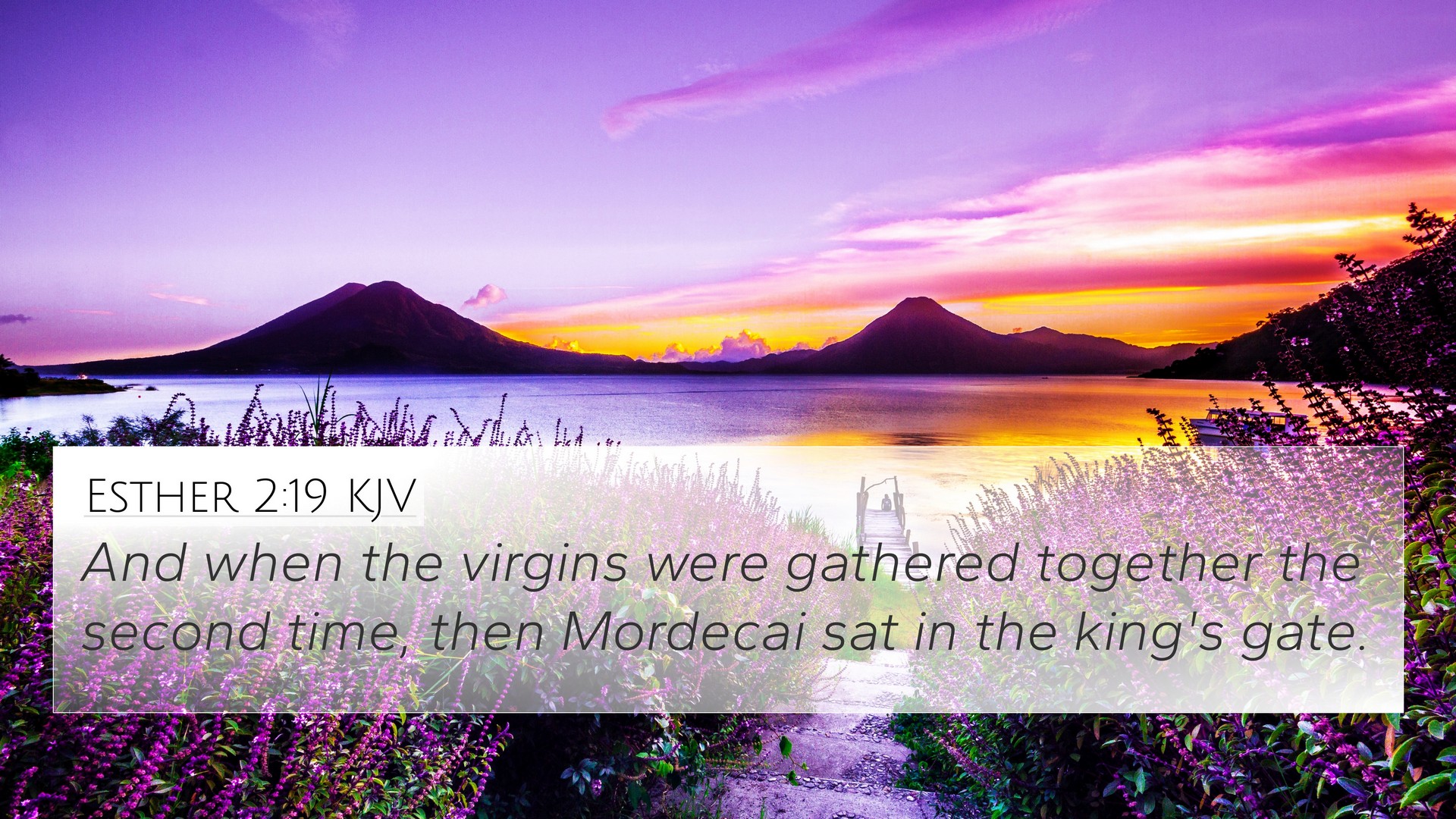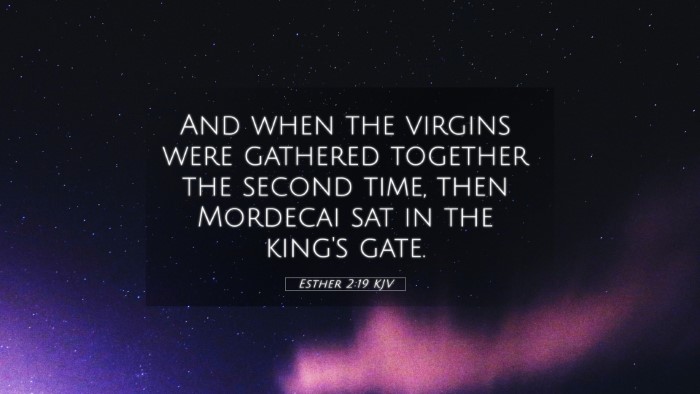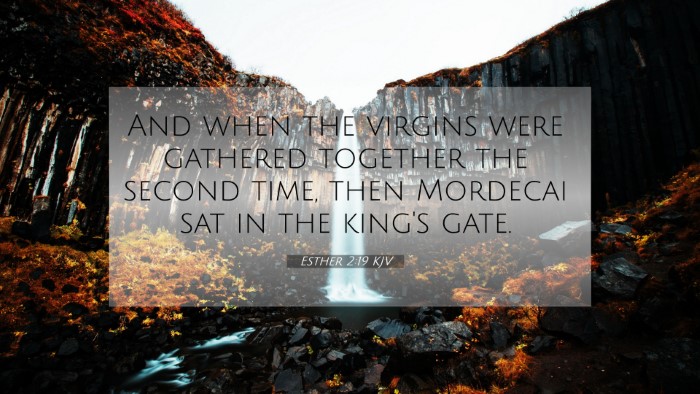Old Testament
Genesis Exodus Leviticus Numbers Deuteronomy Joshua Judges Ruth 1 Samuel 2 Samuel 1 Kings 2 Kings 1 Chronicles 2 Chronicles Ezra Nehemiah Esther Job Psalms Proverbs Ecclesiastes Song of Solomon Isaiah Jeremiah Lamentations Ezekiel Daniel Hosea Joel Amos Obadiah Jonah Micah Nahum Habakkuk Zephaniah Haggai Zechariah MalachiEsther 2:19 Similar Verses
Esther 2:19 Cross References
And when the virgins were gathered together the second time, then Mordecai sat in the king's gate.
Uncover the Rich Themes and Topics of This Bible Verse
Listed below are the Bible themes associated with Esther 2:19. We invite you to explore each theme to gain deeper insights into the Scriptures.
Esther 2:19 Cross Reference Verses
This section features a detailed cross-reference designed to enrich your understanding of the Scriptures. Below, you will find carefully selected verses that echo the themes and teachings related to Esther 2:19 KJV. Click on any image to explore detailed analyses of related Bible verses and uncover deeper theological insights.
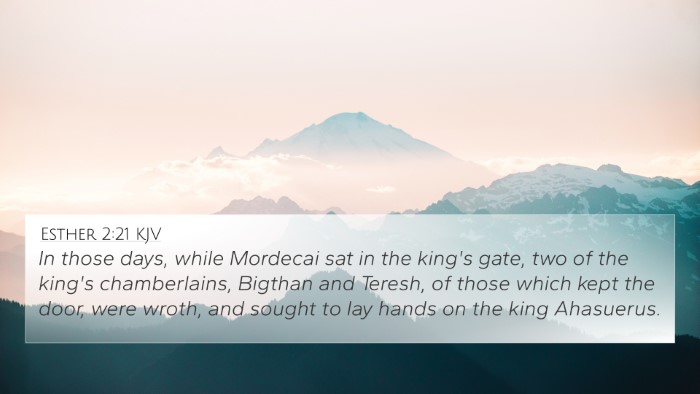
Esther 2:21 (KJV) »
In those days, while Mordecai sat in the king's gate, two of the king's chamberlains, Bigthan and Teresh, of those which kept the door, were wroth, and sought to lay hands on the king Ahasuerus.
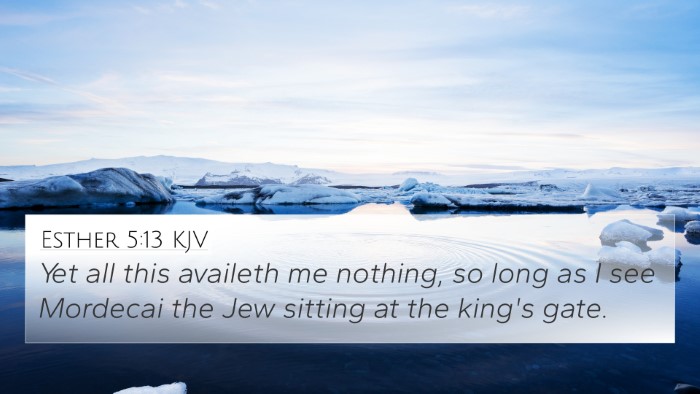
Esther 5:13 (KJV) »
Yet all this availeth me nothing, so long as I see Mordecai the Jew sitting at the king's gate.

Esther 2:3 (KJV) »
And let the king appoint officers in all the provinces of his kingdom, that they may gather together all the fair young virgins unto Shushan the palace, to the house of the women, unto the custody of Hege the king's chamberlain, keeper of the women; and let their things for purification be given them:
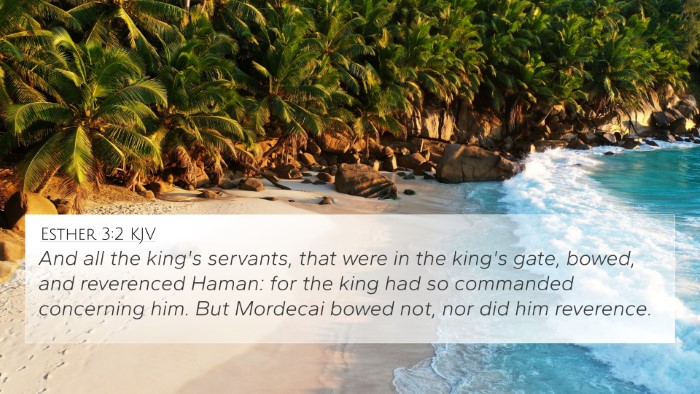
Esther 3:2 (KJV) »
And all the king's servants, that were in the king's gate, bowed, and reverenced Haman: for the king had so commanded concerning him. But Mordecai bowed not, nor did him reverence.
Esther 2:19 Verse Analysis and Similar Verses
Understanding Esther 2:19
Esther 2:19 states, "When the virgins were gathered together the second time, then Esther was brought in unto the king. She was a daughter of Abihail, uncle of Mordecai, who had taken her for his daughter." This verse highlights a key moment in Esther's journey from an orphan to the queen of Persia, indicating both her heritage and the providence of God in her rise to prominence.
Summary of Commentary Insights
In examining this verse, several public domain commentaries provide valuable insights:
- Matthew Henry: Emphasizes the sovereignty of God in the circumstances that led Esther to the palace. He notes that even amidst difficult situations, God works to fulfill His purposes.
- Albert Barnes: Points out the significance of Esther's lineage, which illustrates her rightful place in the royal court. Barnes also emphasizes that the gathering of virgins reflects a structured process in the Persian court.
- Adam Clarke: Highlights Esther’s humble beginnings and the importance of her connection to Mordecai. Clarke discusses how God's plan unfolded through Esther and her adoptive father, showcasing themes of love and familial bonds.
Thematic Connections and Cross-References
Esther 2:19 is deeply interconnected with various Biblical texts, providing a broader understanding of God's workings throughout scripture. Here are key cross-references that relate to this verse:
- Esther 2:5: Introduces Mordecai, establishing his relationship to Esther and their Jewish heritage.
- Esther 4:14: Indicates God’s sovereignty and purpose in Esther's position for such a time as this.
- Jeremiah 29:11: Speaks of God's plans and purposes for His people, echoing the providential theme found in Esther.
- Ruth 4:17: Shows the importance of family lineage, similar to Esther's situation where her background matters.
- Isaiah 43:1: Reminds believers of their identity and belonging, paralleling Esther’s identity as a Jewess.
- Romans 8:28: Expresses the assurance that God works all things for the good of those who love Him, which resonates with Esther’s narrative.
- Philippians 4:19: Reflects God's provision, a theme mirrored in Esther’s journey from obscurity to royal glory.
- Psalm 37:23: States that the steps of a good man are ordered by the Lord, highlighting God’s guidance in Esther's path.
- Acts 17:26: Discusses God’s sovereignty in placing individuals in particular places and times, relevant to Esther’s role in the kingdom.
- Matthew 1:5: Traces genealogy through Ruth, connecting to themes of redemption evident in Esther’s adoption into royalty.
Inter-Biblical Dialogue
Esther 2:19 opens up a conversation across various books of the Bible, revealing thematic ties that lead to a deeper understanding of God's overarching narrative. The connections between Esther's story and other Biblical records highlight the consistent themes of divine guidance, identity, and purpose:
- Connecting Esther to Genesis: Esther’s narrative is akin to the stories of Joseph (Genesis 37-50) where God's providence leads individuals through hardship to fulfillment of divine plans.
- Linking to Exodus: The deliverance themes in Exodus resonate with Esther’s ultimate role in saving her people from destruction.
- Comparative themes in the Gospels: Just as Jesus’ lineage is significant, Esther’s heritage highlights the importance of understanding one’s background in God's plan.
Tools for Bible Cross-Referencing
To delve deeper into scriptures and examine connections like those illustrated in Esther 2:19, various tools and methods enhance cross-referencing:
- Bible Concordance: Useful for locating keywords and exploring related verses quickly.
- Bible Cross-Reference Guide: A structured approach to identifying related scriptures, aiding in deeper study.
- Cross-Reference Bible Study: A method to find parallel passages that enhance comprehension of Biblical themes.
- Comprehensive Bible Cross-Reference Materials: Provide extensive lists of related verses to explore thematic connections.
Conclusion
Esther 2:19 not only gives insight into Esther's journey but also invites readers to explore the profound connections existing within scripture. By understanding this verse through the lens of public domain commentaries, one gains a richer perspective on the divine orchestration of events. The interconnectedness of Biblical narratives emphasizes God’s meticulous planning and the importance of each character's role within His story.
